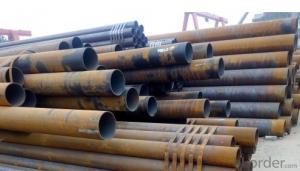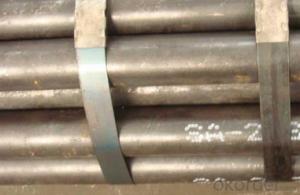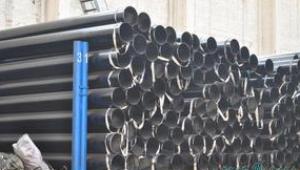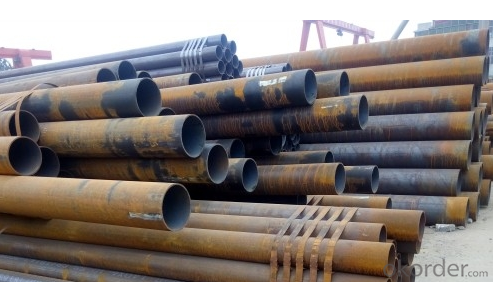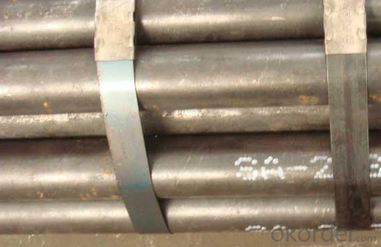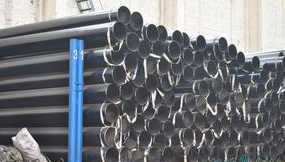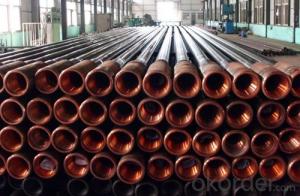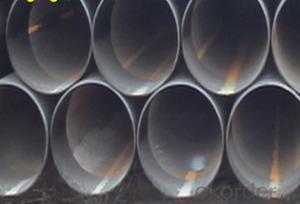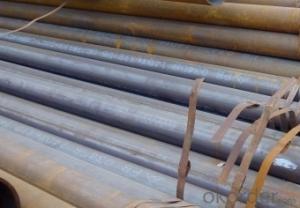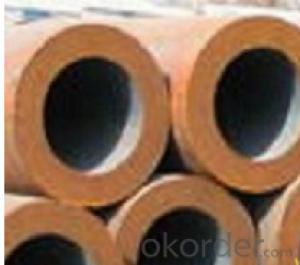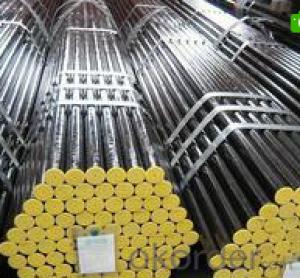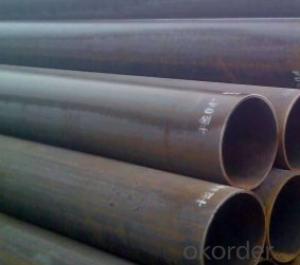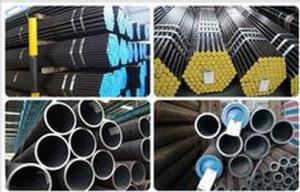Schedule 40 ASTM A53 API 5L GR.B Carbon Seamless Steel Tubes A210 CNBM
- Loading Port:
- Qingdao
- Payment Terms:
- TT OR LC
- Min Order Qty:
- 10 pc
- Supply Capability:
- 30 pc/month
OKorder Service Pledge
OKorder Financial Service
You Might Also Like
Quick Details
| Thickness: | 2.0 - 85 mm | Section Shape: | Round | Outer Diameter: | 17 - 914.4 mm |
| Secondary Or Not: | Non-secondary | Application: | Oil Pipe | ||
| Technique: | Hot Rolled | Certification: | API | Surface Treatment: | VARNISH PAITING |
| Special Pipe: | API Pipe | Alloy Or Not: | Non-alloy | END: | PLAIN,BEVELED OR THREADED |
| Grade: | 10#,20#,16Mn,A106(B,C),A210,A335 P5,A335 P91,A53(A,B),API J55,API K55,Q195,Q235,Q345,St37,St52,10#-45#,A53-A369,API J55-API P110,Q195-Q345,ST35-ST52 | Standard: | API 5CT,API 5L,ASME B36.19M-2004,ASTM A106-2006,ASTM A179-1990,ASTM A182-2001,ASTM A53-2007,BS 1387,DIN 1629/3,DIN EN 10216-1-2004,GB 5310-1995,GB/T 3091-2001,GB/T 8162-1999,GB/T 8163-1999,JIS G3454-2007,API,ASTM,BS,DIN,GB,JIS |
Packaging & Delivery
| Packaging Detail: | standard packing suitable shipping by sea.fixed length as customers' requirements, or SRL or DRL. Varnish, painting or galvanized, or FBE ,2PE,3PE 3pp coating,bevelled/plain/threaded ends with caps, packing in bundle (OD smaller than 141.3mm) big sizes packing in loose, marking as required. Shipped by sea,by air,by train . or some samples shipped by DHL,EMS,TNT,FEDEX ect. Length shorter than 5.85m should be shipped by 20' container, 5.85-12m shipped by 40' container. |
| Delivery Detail: | 7-35 days after advance payment |
Product Description
Seamless steel pipes, a large number of used pipes conveying fluids, such as transport oil, natural gas, gas, water pipes and some solid materials, and so on. Compared to other steel and solid steel bar, the same torsional strength in bending, lighter, is an economic cross-section steel, widely used in the manufacture of structural parts and mechanical parts, such as drill pipe, automotive drive shafts, bicycle rack and construction using steel scaffolding ring with steel pipe manufacturing parts, can improve material utilization, simplify the manufacturing process, saving material and machining time, such as bearing rings, jack sets, has been widely used to manufacture steel. Steel or a variety of conventional weapons indispensable material, gun barrels to make steel. Steel shapes in different cross-sectional area can be divided into tube and shaped tubes. As in the perimeter of equal conditions, the largest area of a circle with a circular tube can carry more fluid. In addition, the circular cross section to withstand internal or external radial pressure, the force is uniform, so the vast majority of the pipe is pipe.
- Q: What does GALV mean in a steel tube?
- GALV is the abbreviation of English galvanized (Galvanized), which means galvanized steel pipe.
- Q: How are steel pipes transported and stored?
- Steel pipes are typically transported by loading them onto trucks or shipping containers, while larger pipes may be transported by rail or barge. During transportation, pipes are secured and protected from damage using straps, braces, or foam padding. Once at the storage site, pipes are usually stacked in a designated area, either vertically or horizontally, depending on their size and weight. They may also be stored in racks or on stands to prevent them from rolling or collapsing. Proper storage conditions include keeping the pipes away from moisture, extreme temperatures, and corrosive substances to maintain their quality.
- Q: What is the role of steel pipes in the food processing industry?
- Steel pipes play a crucial role in the food processing industry as they are used for various applications such as conveying fluids, gases, and other materials throughout the production process. These pipes are resistant to corrosion, have high strength, and can withstand extreme temperatures, making them ideal for transporting food products safely and hygienically. They are widely used for transporting water, steam, and other liquids, as well as for transferring ingredients, such as grains, oils, and sauces. Additionally, steel pipes are utilized in the construction of food processing equipment, such as mixers, blenders, and storage tanks, ensuring the durability and integrity of the entire production system.
- Q: Can steel pipes be used for conveying compressed air?
- Yes, steel pipes can be used for conveying compressed air. Steel pipes are commonly used in applications where high pressure and durability are required, such as in industrial settings. Steel pipes have a high tensile strength and can withstand the high pressures generated by compressed air systems. Additionally, steel pipes are resistant to corrosion, which is important when dealing with moisture in compressed air. However, it is important to ensure that the steel pipes are properly sized and rated for the specific pressure and flow requirements of the compressed air system. Additionally, proper installation and maintenance practices should be followed to prevent any potential leaks or failures.
- Q: How are steel pipes cleaned and maintained?
- Steel pipes are cleaned and maintained through a combination of mechanical and chemical methods. Mechanical cleaning involves removing any loose debris or scale using tools like wire brushes or high-pressure water jets. Chemical cleaning may be used to dissolve any stubborn deposits or corrosion using suitable solvents or acids. Regular inspection and maintenance are essential to identify and address any potential issues such as leaks, rust, or structural damage. Coatings, such as paint or anti-corrosion materials, are often applied to protect steel pipes from environmental factors and extend their lifespan.
- Q: Can steel pipes be used for underground electrical conduits?
- Yes, steel pipes can be used for underground electrical conduits. Steel pipes are durable, strong, and resistant to external forces, making them suitable for protecting electrical wiring in underground installations. Additionally, steel pipes offer excellent corrosion resistance, ensuring the longevity and safety of the electrical system.
- Q: Can steel pipes be used for stormwater management systems?
- Yes, steel pipes can be used for stormwater management systems. Steel pipes are commonly used in stormwater management systems due to their durability, strength, and resistance to corrosion. They can efficiently handle the flow of stormwater and are suitable for underground installation, making them a reliable choice for managing stormwater runoff.
- Q: How do you protect steel pipes from fire?
- There are several measures available to protect steel pipes from fire. One commonly used approach involves applying fire-resistant coatings or paints to the surface of the pipes. These coatings or paints are specifically designed to endure high temperatures and create a barrier that prevents heat from reaching the steel. Another effective method is to wrap the steel pipes with fire-resistant insulation materials. These materials serve as a buffer, reducing heat transfer and slowing down the spread of fire. Mineral wool or ceramic fiber blankets are commonly utilized for this purpose. It is also crucial to ensure proper installation and support for the steel pipes. This includes maintaining adequate clearance from other flammable substances and avoiding overcrowding or obstructions that could hinder the flow of air around the pipes. Sufficient spacing between pipes is also essential to prevent heat transfer between them. Moreover, incorporating firestop systems is recommended when steel pipes pass through fire-rated walls or floors. These systems consist of fire-resistant materials and seals that prevent the spread of fire and smoke through openings or penetrations in fire-rated barriers. Regular maintenance and inspections are essential to uphold the ongoing effectiveness of the fire protection measures. Any damage or deterioration of the coatings, insulation, or firestop systems should be promptly addressed to maintain the fire resistance of the steel pipes. In conclusion, a combination of fire-resistant coatings, insulation, proper installation, and maintenance practices is imperative for safeguarding steel pipes against fire hazards. These measures play a crucial role in minimizing the risk of fire-related damage and ensuring the safety of both the pipes and the surrounding environment.
- Q: How are steel pipes used in the marine industry?
- Steel pipes are commonly used in the marine industry for various applications such as transportation of fluids, structural support, and offshore drilling. They are used for the construction of ships, offshore platforms, and pipelines, as they possess high durability, strength, and corrosion resistance. Additionally, steel pipes are used for cooling systems, ballast transfer, and other critical functions required in marine engineering.
- Q: How are steel pipes used in oil refineries?
- Steel pipes are extensively used in oil refineries for various purposes such as transporting crude oil, refined products, and gases throughout the facility. They are used in the construction of pipelines, process equipment, and storage tanks, providing a reliable and durable solution for handling the vast quantities of liquids and gases involved in the refining process.
Send your message to us
Schedule 40 ASTM A53 API 5L GR.B Carbon Seamless Steel Tubes A210 CNBM
- Loading Port:
- Qingdao
- Payment Terms:
- TT OR LC
- Min Order Qty:
- 10 pc
- Supply Capability:
- 30 pc/month
OKorder Service Pledge
OKorder Financial Service
Similar products
Hot products
Hot Searches
Related keywords
